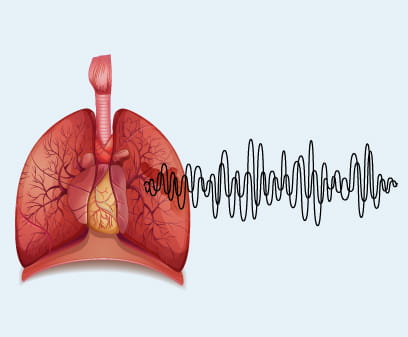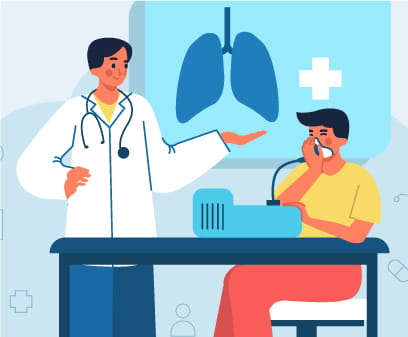What is wheezing?
Wheezing is a high-pitched whistling sound that can come out when you breathe. It usually occurs because the airways in your lungs are partly blocked or swollen. Wheezes are commonly heard when you exhale, suggesting a mild blocked airway. Having wheezing can make it hard to breathe, and you might also feel tightness in your chest. Wheezing may be a symptom of an underlying health condition1,2

Wheezing may be a symptom of any of the following:
.svg?updated=20241115084658)
Conditions that causes narrowing of the airways or swelling of lungs such as COPD, asthma etc
.svg?updated=20241115084703)
Your voice box gets partially closed during breathing
.svg?updated=20241115084708)
Lung infections such as Pneumonia, viral infections etc
.svg?updated=20241115084715)
Acid reflux where stomach acid flows back into the throat.
.svg?updated=20241115084720)
Inhaled small substances that may have blocked the airway
.svg?updated=20241115084726)
Sleep apnea- where your breathing frequently stops and starts during sleep
.svg?updated=20241115084730)
Allergic reaction to pollen, dust & chemicals
Risk factors of wheezing
You're more likely to experience wheezing if you have certain risk factors. Some of the common risk factors include4-6:
.svg?updated=20241115084618)
Smoking
.svg?updated=20241115084631)
Lung cancer
.svg?updated=20241115084646)
History of allergies in the family
.svg?updated=20241115084625)
Early birth
.svg?updated=20241115084639)
Things that can trigger allergies, like pollen, mold, dust etc
.svg?updated=20241115084650)
Frequent contact with infection causing bacteria & germs (children)
Diagnosis
To understand why you're wheezing, the doctor will ask about your medical history and symptoms for a better diagnosis. They may ask you questions like7
.svg?updated=20241115084526)
How long have you been wheezing?
.svg?updated=20241115084532)
Does it happen when you exercise?
.svg?updated=20241115084538)
Do certain foods seem to cause your wheezing?
.svg?updated=20241115084543)
Do you wheeze all the time?
.svg?updated=20241115084549)
Do you wheeze more during the day, or at night?
.svg?updated=20241115084555)
Do you smoke?
The doctor will also hear your breathing using a stethoscope. Once the physical examination is done, the doctor might recommend additional tests to confirm it.
Mild wheezing that might occur along with symptoms of a cold or upper respiratory tract infection usually resolves with time on its own3. But some symptoms may require immediate medical attention.
When to see a doctor
See a doctor if you develop wheezing with any of the following signs and symptoms:
Difficulty breathing
Rapid breathing
Seek emergency care if wheezing:
Begins suddenly after taking medication or eating a food that might cause an allergy.
Is followed by severe difficulty in breathing
Occurs after any substance (such as food or any object) blocks your throat.
Causes bluish tinge to the skin

Management of wheezing
Depending on the conditions or factors causing wheezing, the treatment may vary. Taking your prescribed medications can offer faster relief. Along with medications, you can also take a few steps to manage wheezing7:
.svg?updated=20241115084559)
Drink warm liquids to loosen mucus
.svg?updated=20241115084604)
Avoid smoking and stay away from people who smoke
.svg?updated=20241115084610)
Use a humidifier to keep the air warm
.svg?updated=20241115084614)
Reduce exposure to allergens
Reference
- Gong H. Wheezing and Asthma [Internet]. Nih.gov. Butterworths; 2017. Available from:Click here
- Understanding the symptoms of wheezing. WebMD. [cited 2024 Feb 28]. Available from:Click here
- Mayo Clinic. Wheezing Causes [Internet]. Mayo Clinic. 2018. Available from:Click here
- Moore K Wheezing: Definition, causes, treatments, and more [Internet]. Healthline. 2016 [cited 2024 Feb 28]. Available from: Click here
- Bozaykut. Evaluation of Risk Factors for Recurrent Wheezing Episodes. Journal of Clinical Medicine Research. 2013;
- Crist AP, Anna Maria Hibbs. Prematurity-associated wheeze: current knowledge and opportunities for further investigation. Pediatric Research [Internet]. 2022 Dec 3;94(1):74–81. Available from: Click here
- Wheezing. WebMD. WebMD; 2002. Available from: Click here